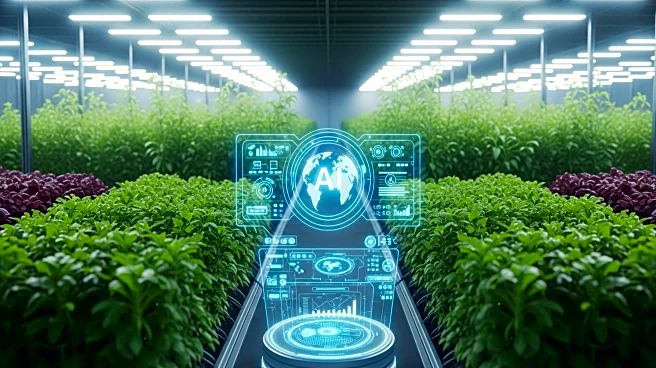What's Happening?
AI is revolutionizing agriculture by enhancing crop selection processes, helping growers identify the best vegetable varieties for diverse markets. Companies like Syngenta Vegetable Seeds and Heritable Agriculture are at the forefront of this transformation, using AI tools to analyze agricultural data and predict the best-performing seed varieties for different regions. This technology allows for precise recommendations based on localized geographical conditions, improving food security and ensuring growers can produce affordable, resilient, and reliable food. As climate conditions change, AI's role in agriculture becomes increasingly important for addressing challenges and optimizing crop production.
Why It's Important?
The integration of AI in agriculture is crucial for improving food security and supporting sustainable farming practices. By providing precise recommendations for seed selection, AI helps growers optimize crop production and adapt to changing climate conditions. This technological advancement supports the global goal of ensuring food availability and resilience in the face of environmental challenges. As AI becomes a strategic tool for agriculture, it sets a precedent for other industries to follow, demonstrating the value of data-driven decision-making in complex environments.
What's Next?
Agricultural companies are expected to continue integrating AI tools to enhance crop selection and improve food security. As these technologies become more prevalent, growers will be better equipped to navigate changing climate conditions and optimize crop production. The ongoing development of AI technology will likely lead to more precise and adaptive systems, supporting the growing complexity of agricultural operations. As companies embrace these advancements, they set a precedent for other sectors to follow, demonstrating the value of integrating AI into strategic planning.
Beyond the Headlines
The shift towards AI-driven agriculture highlights the growing importance of technology in transforming farming practices. This transition not only improves food security but also supports sustainability by optimizing resource use. As agricultural companies adopt these technologies, they set a precedent for other sectors to follow, demonstrating the value of integrating AI into strategic planning. The long-term impact of this shift could lead to more resilient and adaptive agricultural systems, capable of meeting the challenges posed by evolving environmental demands.










